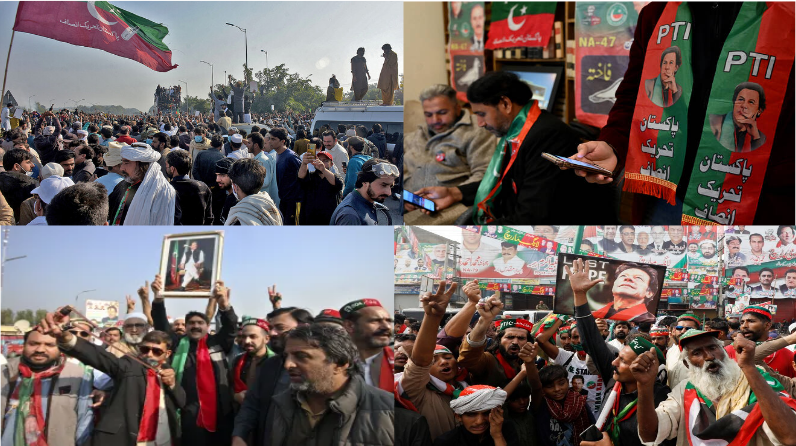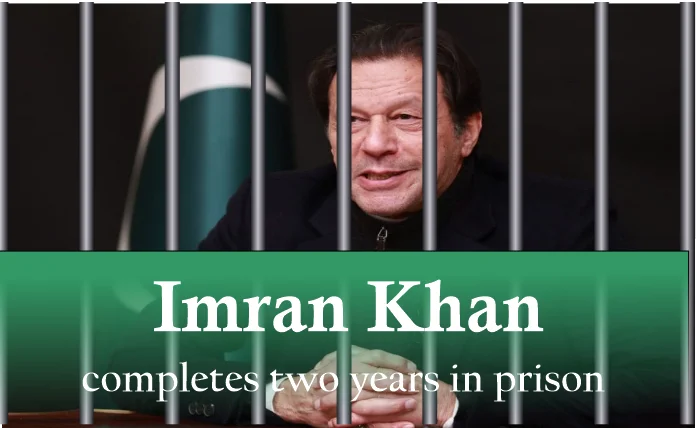Imran Khan Completes Two Years in Prison. Latest news on PTI’s new strategy, political moves, and legal battles shaping Pakistan’s political landscape
Pakistan Tehreek-e-Insaf (PTI) has introduced a revised political and protest strategy as party founder and former prime minister Imran Khan completes two years in prison. The shift comes after the party’s previous march to Islamabad on November 26, 2024, ended without achieving its objectives and was marred by confrontations. This time, PTI has decided against heading to the federal capital, concentrating instead on Punjab. Within the first 100 words of this new phase, PTI’s leadership has highlighted that their approach is designed to avoid previous mistakes while still keeping public mobilization active. The Punjab government has already taken precautionary measures, citing intelligence reports warning of possible unrest similar to the May 9, 2023 incidents.
Imran Khan Completes Two Years in Prison- Shift in PTI’s Protest Focus from Islamabad to Punjab
In contrast to earlier protest plans centered on Islamabad and Khyber Pakhtunkhwa (KP), PTI’s new strategy places Punjab at the forefront. Party sources confirm that this shift is intended to challenge the Pakistan Muslim League-Nawaz (PML-N) stronghold directly. The move follows instructions from Imran Khan to his Punjab leadership to lead demonstrations, aiming for the same level of turnout seen in KP rallies over the past two years. PTI insiders say that the party views Punjab as critical for shaping national political momentum

Government Counter-Strategy and Section 144 Enforcement
The Punjab government, led by Chief Minister Maryam Nawaz, has responded with a preemptive security plan. Spokesperson Azma Bokhari stated that intelligence agencies have warned of a potential repeat of the violence witnessed on May 9, prompting the imposition of Section 144 of the Criminal Procedure Code (CrPC) across the province. She said that peaceful demonstrations would be permitted, but law enforcement would act swiftly against any unlawful assembly or property damage. These measures, according to officials, are aimed at preventing disruptions to public order while respecting citizens’ rights to lawful protest.
Internal Challenges for PTI Leadership
While the focus on Punjab represents a tactical change, PTI’s leadership faces internal disagreements over the execution of the plan. Senior leaders, including Shah Mahmood Qureshi, Ejaz Choudhry, Mahmood Rasheed, Sarfraz Cheema, and Yasmeen Rashid, have endured prison terms since Khan’s arrest. Legal teams have struggled to make progress in securing relief for Khan, particularly after the 26th Constitutional Amendment, which altered certain judicial avenues. The appeal against Khan’s conviction in the £190 million Al-Qadir Trust case remains the party’s primary legal hope, but insiders acknowledge that success is uncertain.
Impact of May 9 Cases and Military Court Convictions
The political environment for PTI has been complicated further by convictions handed down by military courts to over 100 workers and several senior leaders linked to the May 9 incidents. These include disqualifications of legislators from the Punjab Assembly, weakening PTI’s legislative representation. Party sources admit that this has reduced their ability to apply political pressure from within the assemblies, making public mobilization more critical to their strategy.
Failed Alliances and Opposition Coordination Efforts
PTI’s attempts to forge a larger opposition alliance have not yielded results. Efforts to reach an agreement with Maulana Fazlur Rehman of Jamiat Ulema-e-Islam-Fazl stalled due to political rivalry in KP, where Chief Minister Ali Amin Gandapur had defeated Maulana in elections. Talks with Jamaat-e-Islami also ended without agreement, despite past coalition cooperation in KP during the 2013 government. Analysts note that the absence of coordinated opposition action limits PTI’s ability to exert national-level pressure on the government.
Security Alerts and Government Preparedness
Ahead of PTI’s announced protests on August 5, marking Khan’s two years in prison, Punjab authorities have issued alerts to police and security agencies. Law enforcement has been directed to prevent unauthorized gatherings and respond to any outbreak of violence. The government’s position remains that peaceful assembly is a constitutional right, but threats to law and order will be addressed under relevant laws.
Imran Khan’s Political Position and Public Support
Despite his imprisonment, surveys and voting patterns indicate that Imran Khan’s popularity remains strong, as demonstrated by PTI’s performance in the February 8, 2024 general elections. Political observers note that while public backing for Khan has not diminished significantly, the party’s protest campaigns have yet to achieve concrete results. This has raised questions about whether the shift to Punjab will bring the breakthrough PTI seeks.
Potential International Reaction to Military Court Trial
Legal analysts point out that if Khan were to face trial in a military court over the May 9 cases, it would be unprecedented for a former prime minister. Such a move could attract international attention from human rights organizations, particularly given past global responses to high-profile political trials in Pakistan. However, government officials have not confirmed whether such proceedings will take place.
Comparison to Past Political Bans
Some political commentators compare PTI’s current challenges to the aftermath faced by MQM-London following its founder’s August 22, 2016 speech, which led to an effective ban. Like MQM-London, PTI is contending with legal constraints, leadership arrests, and government efforts to curtail political activity. However, unlike MQM-London, PTI retains substantial grassroots support, especially among younger voters.
Battle for Punjab as the Central Arena
This protest phase has been dubbed internally by PTI as the “Battle for Punjab.” By focusing resources on the country’s most populous province, PTI aims to demonstrate that it can mobilize beyond its traditional KP base. Success in Punjab would not only challenge the PML-N government but also reassert PTI’s presence as a national political force. The government, however, appears committed to preventing any large-scale disruption in the province, making this confrontation a critical test for both sides.
Uncertainty Over Khan’s Early Release
Khan’s early release appears improbable under current circumstances. With legal relief unlikely in the short term and no signals from the establishment indicating a willingness to negotiate, PTI’s immediate strategy relies heavily on public demonstrations. Party insiders say that failure to mobilize effectively in Punjab could deepen existing internal rifts and weaken morale among supporters.
Conclusion: Imran Khan Completes Two Years in Prison
As August 5 unfolds, PTI’s new strategy will be tested under heavy government scrutiny and legal constraints. The outcome will influence not only Khan’s political trajectory but also the party’s standing in the national political landscape. Whether the focus on Punjab delivers the intended results or becomes another stalled effort, the coming weeks will be decisive for PTI’s role in Pakistan’s evolving political environment

